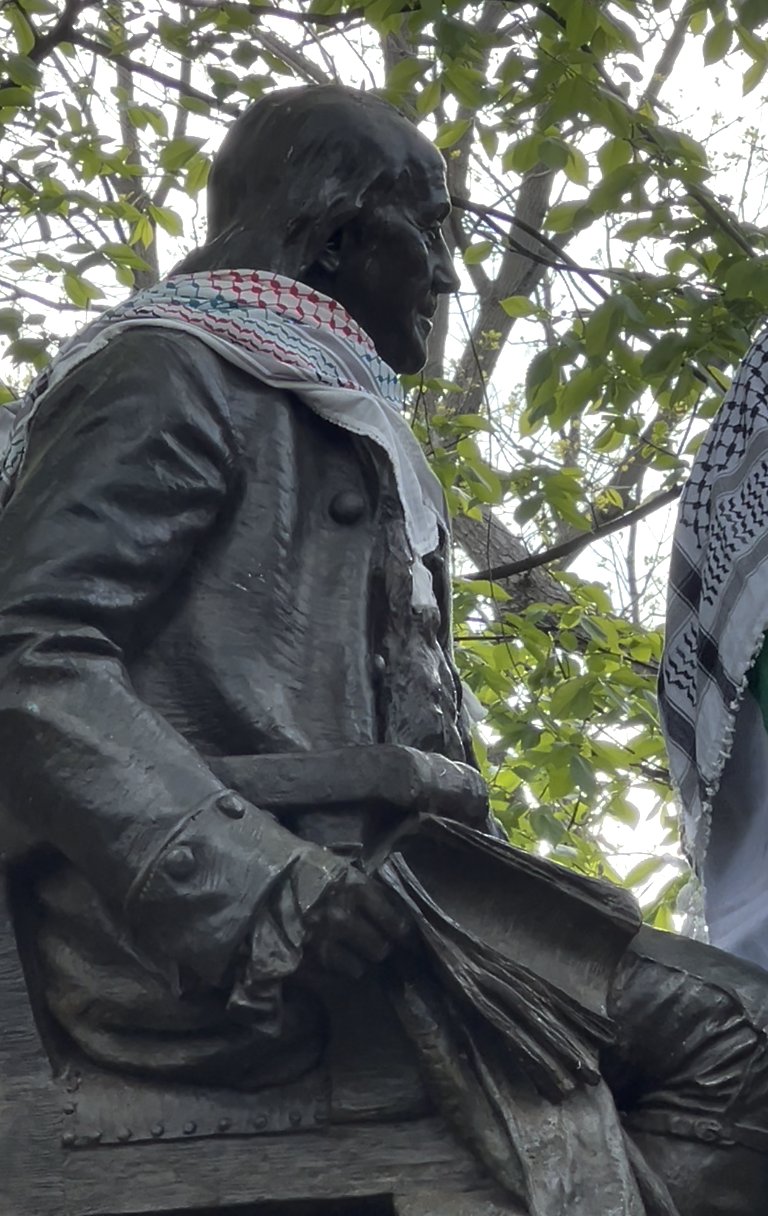Are Soros-Funded Campus Protest Groups Colluding with Progressive Prosecutors?

(This article first appeared in Broad + Liberty.)
Many locations where organizations linked to George Soros have funded a national wave of anti-Israel protests on college campuses which directly correlate to prosecutors whose elections were also funded by Soros. This week, Philadelphia joined this unfortunate group with encampments appearing at the University of Pennsylvania.
Soros-funded prosecutors have dropped or refused charges against protesters who have been arrested for a myriad of offenses related to the antisemitic occupations on American college campuses. The correlation in funding between groups committing intimidation, harassment, and assaults toward Jews and the elected law enforcement officials refusing to prosecute them raises uncomfortable questions of conflict and corruption.
As noted in a new report from New York Post, the National Students for Justice for Palestine organization is funded by a number of nonprofits that themselves are funded by Soros and others. At three colleges, US Campaign for Palestinian Rights (USCPR), a Soros-funded group, pays “fellows” who start protests on campus. The Post reports that the USCPR pays up to $7,800 to community-based fellows and between $2,880 and $3,660 for campus-based “fellows” who are expected to spend eight hours per week organizing “campaigns led by Palestinian organizations,” and are trained to “rise up, to revolution.”
Since 2017, the USCPR has received at least $300,000 from Soros’ Open Society Foundations. The group has also received $355,000 in funds from the Rockefeller Brothers Fund since 2019.

Coincidentally, the United States has 70 prosecutors in office whose elections were funded by Soros-established nonprofit groups, down from 82 after twelve left office in 2022. A map from the Law Enforcement Legal Defense Fund shows the prosecutors scattered across the country. This includes Travis County Attorney Delia Garza, who dismissed all 57 cases resulting from arrests at unlawful Anti-Israel protests at the University of Texas at Austin last week. In a Texas Tribune report, Garza said that “law enforcement lacked probable cause in the 57 cases she dismissed.”
“Legal concerns were raised by defense counsel,” Diana Melendez, a spokesperson for the Travis County Attorney’s Office, said in a Thursday statement. “The Court affirmed and ordered the release of those individuals.”
Garza, Austin’s Soros-funded prosecutor’s contention that the 57 arrests brought to her office by Texas State Troopers, Austin, and UT Police officers directly contradicts the evidence broadcasted in multiple videos broadcasted in social and news media outlets. The arrests occurred during a chaotic demonstration at UT-Austin, where more than 500 students walked out of class to demand that the university divest from manufacturers supplying Israel weapons on its strikes on Gaza.
In a statement to KXAN, a UT spokesperson said that 26 of the arrestees were unaffiliated with the university, which would automatically result in trespassing charges once the protesters refused to leave when ordered by UT police.
Former President of the University of Texas Students for Justice in Palestine, Nidaa Lafi, a fellow for the USCPR was spotted at an anti-Israel encampment Wednesday at the University of Texas at Dallas giving a speech and demanding Israel end its war in Gaza. Lafi was detained in January for blocking the road where President Biden’s motorcade was set to travel for the funeral of the late Democratic Congresswoman Eddie Bernice Johnson, whom she used to work for.
Arrests were also made on the campuses of USC and UCLA in Los Angeles, where Soros-funded George Gascon serves as the District Attorney.
The center of these unlawful protests is at Columbia University, in Manhattan where Soros-funded Alvin Bragg serves as District Attorney. Over 100 arrests have been made by the NYPD resulting from the Columbia protests, but all have since been released. The Columbia encampment was organized by Students for Justice in Palestine (SJP), Jewish Voice for Peace (JVP) and Within Our Lifetime. According to an analysis by the Post, all three of the organizations received money from groups Soros is linked to.
Soros’ Open Society Foundation, the same group responsible for setting up and funding Political Action Committees to fund progressive prosecutors, has given in total over $20 million to the progressive nonprofit the Tides Foundation, which has given money to groups such as Jewish Voice for Peace. As Campus Reform has reported, the Open Society Foundation has given $650,000 to Jewish Voice for Peace, which cited “Israeli apartheid and occupation” as “the source of all this violence.”
A spokesperson for the Open Society Foundation told the New York Post: “Open Society has funded a broad spectrum of US groups that have advocated for the rights of Palestinians and Israelis and for peaceful resolution to the conflict in Israel and the OPT,” the spokesperson said. “This funding is a matter of public record, disclosed on our website, fully compliant with US laws, and is part of our commitment to continuing open debate that is ultimately the only hope for peace in the region.”
If criminal groups and the prosecutors responsible for charging them share funding sources, does that constitute corruption or a clear conflict of interest?
Furthermore, questions can be raised about a two-tiered criminal justice system, especially in light of the Special Counsel, Arizona, and Georgia election interference cases against President Donald Trump and his associates, where tenuous racketeering and conspiracy charges are levied even many years after the alleged crimes were committed.
“The conflict issue requires an analysis of the closeness of the relationship,” said former federal prosecutor and Chester County DA Thomas Hogan. “I never recused myself from prosecuting an official from my own political party, having prosecuted the close friend of my own campaign finance director. Of course, since I was prosecuting, not declining to prosecute, the dynamics were different.”
Opining on the apparent absence of an investigation or prosecution at a federal level, Hogan continued, “You might think of it as trying to figure out if the DA should recuse themselves [for example], if the child of a major donor is charged with a crime.”



